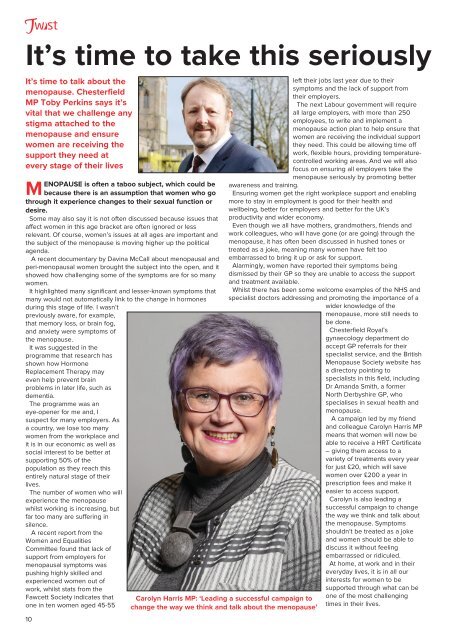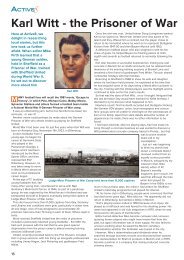Twist issue 148 April 2023
Create successful ePaper yourself
Turn your PDF publications into a flip-book with our unique Google optimized e-Paper software.
Tw st<br />
It’s time to take this seriously<br />
It’s time to talk about the<br />
menopause. Chesterfield<br />
MP Toby Perkins says it’s<br />
vital that we challenge any<br />
stigma attached to the<br />
menopause and ensure<br />
women are receiving the<br />
support they need at<br />
every stage of their lives<br />
M<br />
ENOPAUSE is often a taboo subject, which could be<br />
because there is an assumption that women who go<br />
through it experience changes to their sexual function or<br />
desire.<br />
Some may also say it is not often discussed because <strong>issue</strong>s that<br />
affect women in this age bracket are often ignored or less<br />
relevant. Of course, women’s <strong>issue</strong>s at all ages are important and<br />
the subject of the menopause is moving higher up the political<br />
agenda.<br />
A recent documentary by Davina McCall about menopausal and<br />
peri-menopausal women brought the subject into the open, and it<br />
showed how challenging some of the symptoms are for so many<br />
women.<br />
It highlighted many significant and lesser-known symptoms that<br />
many would not automatically link to the change in hormones<br />
during this stage of life. I wasn’t<br />
previously aware, for example,<br />
that memory loss, or brain fog,<br />
and anxiety were symptoms of<br />
the menopause.<br />
It was suggested in the<br />
programme that research has<br />
shown how Hormone<br />
Replacement Therapy may<br />
even help prevent brain<br />
problems in later life, such as<br />
dementia.<br />
The programme was an<br />
eye-opener for me and, I<br />
suspect for many employers. As<br />
a country, we lose too many<br />
women from the workplace and<br />
it is in our economic as well as<br />
social interest to be better at<br />
supporting 50% of the<br />
population as they reach this<br />
entirely natural stage of their<br />
lives.<br />
The number of women who will<br />
experience the menopause<br />
whilst working is increasing, but<br />
far too many are suffering in<br />
silence.<br />
A recent report from the<br />
Women and Equalities<br />
Committee found that lack of<br />
support from employers for<br />
menopausal symptoms was<br />
pushing highly skilled and<br />
experienced women out of<br />
work, whilst stats from the<br />
Fawcett Society indicates that<br />
one in ten women aged 45-55<br />
10<br />
Carolyn Harris MP: ‘Leading a successful campaign to<br />
change the way we think and talk about the menopause’<br />
left their jobs last year due to their<br />
symptoms and the lack of support from<br />
their employers.<br />
The next Labour government will require<br />
all large employers, with more than 250<br />
employees, to write and implement a<br />
menopause action plan to help ensure that<br />
women are receiving the individual support<br />
they need. This could be allowing time off<br />
work, flexible hours, providing temperaturecontrolled<br />
working areas. And we will also<br />
focus on ensuring all employers take the<br />
menopause seriously by promoting better<br />
awareness and training.<br />
Ensuring women get the right workplace support and enabling<br />
more to stay in employment is good for their health and<br />
wellbeing, better for employers and better for the UK’s<br />
productivity and wider economy.<br />
Even though we all have mothers, grandmothers, friends and<br />
work colleagues, who will have gone (or are going) through the<br />
menopause, it has often been discussed in hushed tones or<br />
treated as a joke, meaning many women have felt too<br />
embarrassed to bring it up or ask for support.<br />
Alarmingly, women have reported their symptoms being<br />
dismissed by their GP so they are unable to access the support<br />
and treatment available.<br />
Whilst there has been some welcome examples of the NHS and<br />
specialist doctors addressing and promoting the importance of a<br />
wider knowledge of the<br />
menopause, more still needs to<br />
be done.<br />
Chesterfield Royal’s<br />
gynaecology department do<br />
accept GP referrals for their<br />
specialist service, and the British<br />
Menopause Society website has<br />
a directory pointing to<br />
specialists in this field, including<br />
Dr Amanda Smith, a former<br />
North Derbyshire GP, who<br />
specialises in sexual health and<br />
menopause.<br />
A campaign led by my friend<br />
and colleague Carolyn Harris MP<br />
means that women will now be<br />
able to receive a HRT Certificate<br />
– giving them access to a<br />
variety of treatments every year<br />
for just £20, which will save<br />
women over £200 a year in<br />
prescription fees and make it<br />
easier to access support.<br />
Carolyn is also leading a<br />
successful campaign to change<br />
the way we think and talk about<br />
the menopause. Symptoms<br />
shouldn’t be treated as a joke<br />
and women should be able to<br />
discuss it without feeling<br />
embarrassed or ridiculed.<br />
At home, at work and in their<br />
everyday lives, it is in all our<br />
interests for women to be<br />
supported through what can be<br />
one of the most challenging<br />
times in their lives.


















